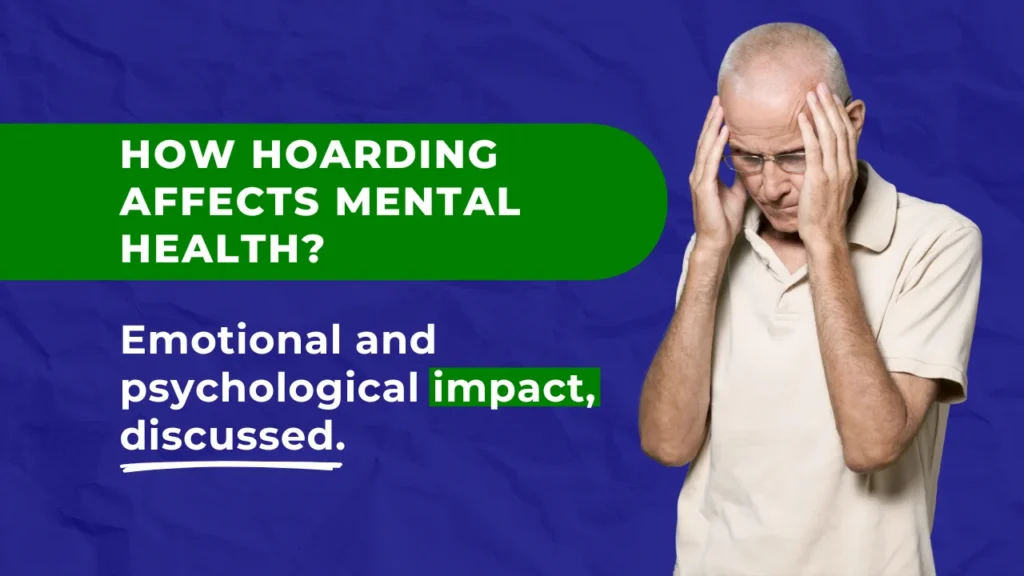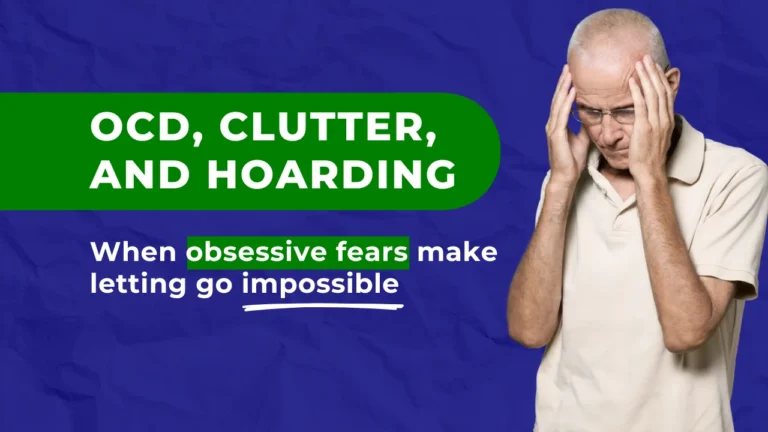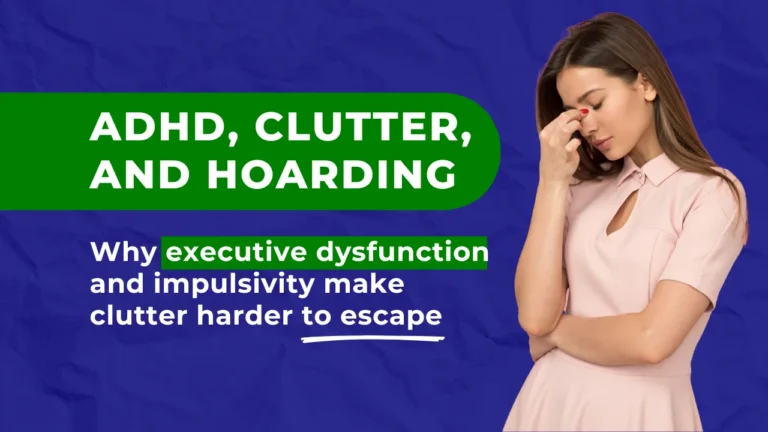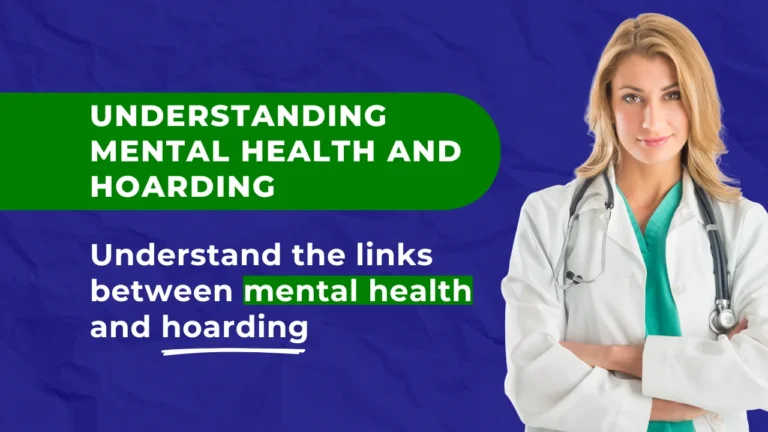Hoarding disorder is characterized by the inability to discard possessions, regardless of their value. While the hoarder themselves is directly impacted by their disorder, the psychological effects of living with a hoarder—whether family members, partners, or roommates can be profound and far-reaching.
Imagine coming home every day to a space filled with piles of objects, where navigating through rooms is a daily struggle. The overwhelming amount of stuff can create a sense of chaos that seeps into every aspect of your life, making it hard to relax, focus, or even think clearly. In this blog, we’ll explore how living with a hoarder can affect your mental and emotional well-being and steps you can take to protect your well-being.
To gain deeper insights into the relationship between mental illness and hoarding, and how it impacts both individuals and their loved ones, refer to our comprehensive article on mental health and hoarding.
Understanding the Psychological Effects of Living with a Hoarder
Living with a hoarder doesn’t just clutter your home; it can clutter your mind too. The constant mess can lead to stress, anxiety, and even depression. It’s important to recognize these psychological effects of living with a hoarder so you can take steps to protect your emotional wellbeing.
The Emotional Toll of Constant Clutter
One of the most immediate and noticeable effects of living with a hoarder is the emotional strain. Homes that are packed with items -often to the point where living spaces become unusable- create an environment of chaos and stress.
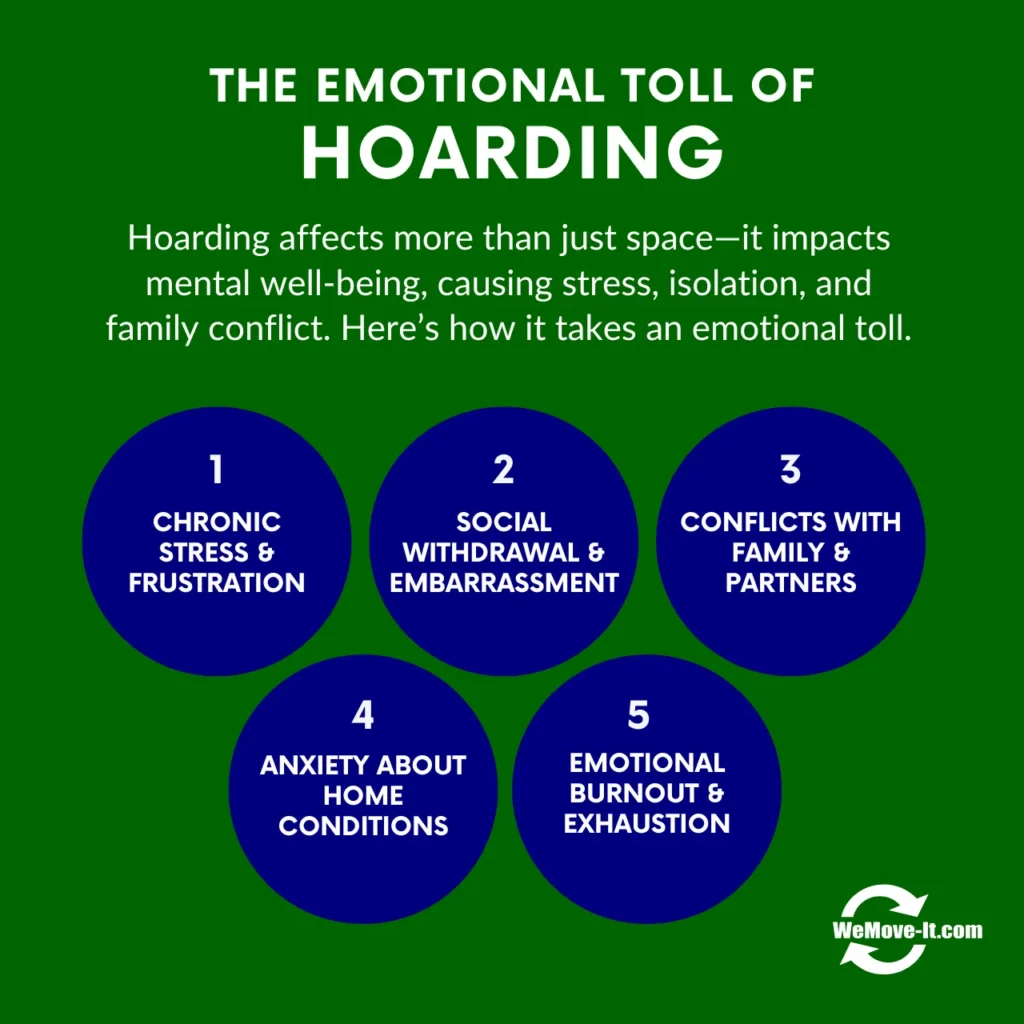
This constant exposure to disorganization can lead to feelings of frustration, helplessness, and anxiety.
Research has shown that the clutter in hoarding households is often tied to personality disorders linked to hoarding, which can intensify the emotional strain on family members.

An article published in the Psychiatric Times found that spouses and children of hoarders are more likely to experience chronic stress, anxiety, and depression. The constant presence of clutter serves as a daily reminder of the hoarder’s inability to control their behaviour, leading to a sense of hopelessness and despair in those experiencing the psychological effects of living with a hoarder.
Social Isolation and Embarrassment
Living with a hoarder often leads to social isolation, as the embarrassment of inviting people into a cluttered and chaotic home can cause you to withdraw from social interactions.

This isolation can lead to loneliness, which, over time, can contribute to depression and anxiety. The psychological effects of living with a hoarder can thus extend beyond the home, impacting one’s broader social life.
An article in Anxiety.org revealed that most people living with hoarders reported avoiding social gatherings in their homes due to embarrassment. This self-imposed isolation not only impacts social life but can also strain relationships with friends and extended family, leading to a lack of support when it’s needed most.
Strained Family Relationships
Hoarding can put a huge strain on family relationships. The hoarder’s refusal or inability to acknowledge the problem often leads to conflicts, frustration, and resentment among family members.

Arguments may arise over the hoarder’s reluctance to declutter, and these conflicts can erode trust and communication within the family.
A study by the International OCD Foundation (IOCDF) found that families of hoarders often experience high levels of dysfunction, with frequent conflicts over the hoarding behaviour. Children of hoarders, in particular, may feel neglected and resentful, believing that their parent or parents value possessions more than their relationship with them. This dynamic can lead to long-term emotional damage and strained relationships that persist into adulthood.
Financial Stress
Hoarding can also lead to financial stress for the entire family. For example:
- The compulsion to acquire and keep items often results in excessive spending, leading to debt and financial instability. For many, deep-seated emotional triggers fuel these behaviours, making it difficult to stop. A hoarder parent may spend most of their money on new items and forgo the rent, resulting in a difficult housing situation.
- When a home is too cluttered, maintaining or repairing it can become extremely expensive. Too many heavy items could result in a complete floor replacement, which can cost thousands of dollars.
This can add to the overall tension in the household, further exacerbating the psychological effects on those living with the hoarder.
Health Risks and Anxiety
For seniors, these risks are even more concerning, as mobility issues can make it harder to navigate cluttered spaces safely. Cluttered spaces can make it difficult to clean properly, leading to the accumulation of dust, mold, and other allergens. In extreme cases, hoarded homes may also harbor pests, such as rodents and insects, creating unsanitary and potentially dangerous living conditions.
According to the National Fire Protection Association (NFPA), homes with excessive clutter are at a significantly higher risk of fire-related injuries and deaths. The presence of fire hazards and the difficulty in escaping a cluttered home during an emergency can create a constant undercurrent of anxiety for those living in the household.
Psychological Impact on Children
Children who grow up in hoarding environments often face psychological challenges. The chaos and disorganization can interfere with their academic performance, social development, and emotional well-being.

These children may also experience feelings of shame, embarrassment, and social isolation, which can lead to long-term psychological issues like anxiety disorders and depression.
The Burden of Caregiving
The role of caregiver often falls on those living with a hoarder. Whether it’s managing the day-to-day challenges of living in a cluttered environment or trying to help the hoarder seek treatment, the emotional and physical demands of caregiving can be overwhelming.

Caregivers of hoarders often experience burnout, chronic stress, and even symptoms of depression. The constant struggle to manage the hoarder’s behaviour, combined with the lack of progress in addressing the issue, can lead to feelings of hopelessness and despair
The Impact on Mental Health
Living with a hoarder can have a profound impact on your health. The constant exposure to clutter, the social isolation, the strain on family relationships, and the health risks all contribute to a heightened sense of anxiety and stress. Over time, these factors can lead to more serious health issues, such as depression, generalized anxiety disorder, and even post-traumatic stress disorder (PTSD).
How You Can Seek Help
If you’re living with a hoarder, it’s important to recognize the impact this environment can have on your emotional well-being. While it can be challenging to address the issue, seeking help is a critical step in improving your quality of life.
- Talk to a Professional: If handled the wrong way, conversations about hoarding can trigger defensiveness. Learning how to approach a conversation with a hoarder can help foster trust and encourage positive change. They can help you address the emotional challenges of living with a hoarder and provide strategies for coping with the situation.
- Join a Support Group: Connecting with others who are in similar situations can be incredibly helpful. Support groups offer a safe space to share your experiences and learn from others who understand what you’re going through.
- Consider Professional Cleanup Services: If the clutter has become overwhelming, professional hoarder cleanup services, like WeMove-It.com, can help restore your home to a safe and livable condition. These services are compassionate and respectful of the hoarder’s situation, ensuring that the cleanup process is handled with care.
A Happier Future Awaits
As hoarding behaviours progress, they tend to escalate over time. Studies suggest that hoarding behaviours often intensify, making intervention increasingly difficult. You might find yourself constantly worried about the state of your home or anxious about what would happen if someone were to visit. The clutter becomes a barrier, not just in your home, but in your life- preventing you from forming close relationships and enjoying social interactions.
If you’re struggling to cope with the effects of living with a hoarder, reach out for support. At WeMove-It.com, we know how sensitive your situation is and offer compassionate cleanup services in Burlington and the Greater Hamilton areas to help you reclaim your home while preserving your privacy. To learn how we can assist you in restoring your home, contact us today.

